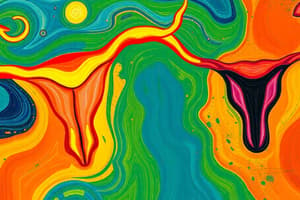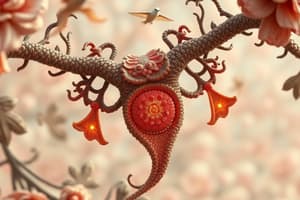Podcast
Questions and Answers
What is a common adverse effect of oral contraceptives?
What is a common adverse effect of oral contraceptives?
- Improved skin condition
- Weight loss
- Increased fertility
- Headaches (correct)
What is a significant advantage of using subcutaneous implants for contraception?
What is a significant advantage of using subcutaneous implants for contraception?
- Lower cost compared to surgical methods
- Requires daily intake
- Immediate effect within hours
- Nearly reliable as sterilization (correct)
Which mechanism of action is attributed to the use of large doses of estrogens in postcoital contraceptives?
Which mechanism of action is attributed to the use of large doses of estrogens in postcoital contraceptives?
- Increasing motility of oviduct (correct)
- Decreasing endometrial shedding
- Enhancing implantation
- Inhibiting ovulation
What is a common adverse effect specifically associated with progestins?
What is a common adverse effect specifically associated with progestins?
Which of the following conditions is considered a contraindication for oral contraceptives?
Which of the following conditions is considered a contraindication for oral contraceptives?
What is a common disadvantage of using the postcoital contraceptive method with estrogens?
What is a common disadvantage of using the postcoital contraceptive method with estrogens?
Which hormone is primarily released by the Progestasert IUD?
Which hormone is primarily released by the Progestasert IUD?
What is a key characteristic of the mechanism of action of combined oral contraceptives?
What is a key characteristic of the mechanism of action of combined oral contraceptives?
What is one of the primary advantages of triphasic combination contraceptives?
What is one of the primary advantages of triphasic combination contraceptives?
What mechanism primarily prevents ovulation in combined oral contraceptives?
What mechanism primarily prevents ovulation in combined oral contraceptives?
Which form of contraception does NOT inhibit ovulation?
Which form of contraception does NOT inhibit ovulation?
What is a common disadvantage of progestin-only contraceptives?
What is a common disadvantage of progestin-only contraceptives?
In the triphasic contraceptive regimen, which phase contains the highest amount of progestogen?
In the triphasic contraceptive regimen, which phase contains the highest amount of progestogen?
What is the impact of the estrogen component in combined oral contraceptives?
What is the impact of the estrogen component in combined oral contraceptives?
Which statement is true regarding depot therapy with medroxyprogesterone acetate?
Which statement is true regarding depot therapy with medroxyprogesterone acetate?
What effect do combined oral contraceptives have on cervical mucus?
What effect do combined oral contraceptives have on cervical mucus?
What is the most common adverse effect associated with hormonal contraceptives?
What is the most common adverse effect associated with hormonal contraceptives?
Which of the following conditions is a contraindication for the use of estrogen-based contraceptives?
Which of the following conditions is a contraindication for the use of estrogen-based contraceptives?
What is the primary component of combination oral contraceptives?
What is the primary component of combination oral contraceptives?
Which synthetic progestin is known for being administered orally on a daily basis?
Which synthetic progestin is known for being administered orally on a daily basis?
What is one of the therapeutic uses of progestins?
What is one of the therapeutic uses of progestins?
What is a potential adverse effect of using progestins derived from testosterone?
What is a potential adverse effect of using progestins derived from testosterone?
Which method of contraception does not involve hormonal mechanisms?
Which method of contraception does not involve hormonal mechanisms?
What is the function of postcoital or 'morning after' contraceptives?
What is the function of postcoital or 'morning after' contraceptives?
Flashcards
Subcutaneous implants
Subcutaneous implants
Hormone-releasing implants placed under the skin, providing long-term contraception.
Progesterone Releasing IUD
Progesterone Releasing IUD
Intrauterine device releasing progesterone locally for contraception.
Post-coital/Morning-after pill
Post-coital/Morning-after pill
Emergency contraception taken after unprotected sex to prevent pregnancy.
Oral Contraceptives Adverse Effects
Oral Contraceptives Adverse Effects
Signup and view all the flashcards
Contraindications of Oral Contraceptives
Contraindications of Oral Contraceptives
Signup and view all the flashcards
Menstrual Irregularities
Menstrual Irregularities
Signup and view all the flashcards
Infertility after contraceptive discontinuation
Infertility after contraceptive discontinuation
Signup and view all the flashcards
Mechanism of postcoital pills
Mechanism of postcoital pills
Signup and view all the flashcards
Triphasic Combination Pill
Triphasic Combination Pill
Signup and view all the flashcards
Combination Pill Side Effects
Combination Pill Side Effects
Signup and view all the flashcards
Estrogen's Role (Birth Control)
Estrogen's Role (Birth Control)
Signup and view all the flashcards
Progestin's Role (Birth Control)
Progestin's Role (Birth Control)
Signup and view all the flashcards
Minipill (Mechanism)
Minipill (Mechanism)
Signup and view all the flashcards
Minipill Disadvantage
Minipill Disadvantage
Signup and view all the flashcards
Depot Progestogen
Depot Progestogen
Signup and view all the flashcards
Withdrawal Period (Birth Control)
Withdrawal Period (Birth Control)
Signup and view all the flashcards
Adverse Effects of Oral Contraceptives
Adverse Effects of Oral Contraceptives
Signup and view all the flashcards
Contraindications for Estrogen/Progestin Drugs
Contraindications for Estrogen/Progestin Drugs
Signup and view all the flashcards
Drug Interactions with Hormonal Contraceptives
Drug Interactions with Hormonal Contraceptives
Signup and view all the flashcards
Progestins and Progesterone
Progestins and Progesterone
Signup and view all the flashcards
Therapeutic Uses of Progestins
Therapeutic Uses of Progestins
Signup and view all the flashcards
Combination Oral Contraceptives (COCs)
Combination Oral Contraceptives (COCs)
Signup and view all the flashcards
Progestin-Only Contraceptives
Progestin-Only Contraceptives
Signup and view all the flashcards
Methods of Contraception
Methods of Contraception
Signup and view all the flashcards
Study Notes
Gonadal Hormones & Inhibitors
- Estrogens, progestins, oral contraceptives, inhibitors, and ovulation-inducing agents are discussed.
- The hypothalamus releases GnRH, which stimulates the pituitary to release FSH and LH, leading to estrogen production in the ovary.
- Natural estrogens are well-absorbed orally but are rapidly metabolized. Most estrogens are absorbed through skin and mucous membranes, allowing for transdermal administration.
- Topical vaginal administration is also possible, with some absorption occurring.
- Natural estrogens (like estradiol) undergo first-pass metabolism, resulting in low bioavailability when taken orally.
- Semisynthetic estrogens (like ethinyl estradiol) are potent, taken orally, and protected from liver inactivation. Mestranol is rapidly oxidized to ethinyl estradiol and stored in fat tissue for long-term availability.
Estrogen Mechanisms
- Estrogens act through two primary mechanisms: genomic and non-genomic.
- Genomic: Steroid hormones bind to specific nuclear receptors, initiating RNA synthesis and protein production for various physiological functions.
- Non-genomic: Estrogen receptor activation in hypothalamic membranes couples with G proteins, triggering second messenger cascades for faster actions.
Estrogen Therapeutic Uses
- Contraception with progestogens
- Postmenopausal hormone therapy (HT): Used for menopausal symptoms (hot flushes, vaginal atrophy) in conjunction with progestogen to reduce endometrial cancer risk. Doses are lower than oral contraceptives to minimize side effects.
- Replacement therapy: Used in primary hypogonadism (ovarian failure) and premature menopause for hormone replacement.
Estrogen Adverse Effects
- Nausea, breast tenderness are common.
- Increased blood clotting (thromboembolic events, myocardial infarction).
- Salt and water retention (edema, hypertension).
- Increased blood sugar levels
- Increased risk of breast and/or endometrial cancer.
Progesterone (Progestogens)
- Progesterone is the natural progestational hormone.
- Preparations include natural progesterone (rapidly metabolized), and synthetic derivatives (effective orally) including medroxyprogesterone acetate and norethindrone/norgestrel.
- Therapeutic uses include oral contraception, and treatment of functional uterine bleeding, dysmenorrhea, amenorrhea, and endometriosis.
- Adverse effects include weak androgenic actions (edema, psychic depression), increased cholesterol, and atherosclerosis.
Contraception Methods
- Combination oral contraceptives: Estrogen + progestin taken for 21 days with a 7-day break for menstruation. Available as monophasic, biphasic, or triphasic formulations.
- Progestin-only contraceptives: Norethindrone or levonorgestrel, taken daily without interruption. This approach has fewer side effects compared to combination pills.
- Depot therapy: Medroxyprogesterone acetate injection every 3 months. Useful post-delivery as it doesn't affect lactation.
- Subcutaneous implants: Progestins released slowly via implants. Long-term, reversible, and doesn't depend on patient compliance.
Post-coital Contraceptives
- Estrogen alone: Diethylstilbestrol taken in high doses within 72 hours of intercourse
- Estrogen + progestogen: Taken in two doses within 72 hours.
Contraindications to Hormonal Contraceptives
- History of thromboembolic disorders, certain types of cancer (estrogen-dependent).
- Other conditions, as listed.
Drug Interactions
- Oral contraceptives can influence the effects of anticoagulants, antihypertensives, and antihyperlipidemics.
- Enzyme inducers like phenytoin and rifampicin can increase estrogen metabolism.
Anti-Estrogens & Anti-Progestogens
- Selective estrogen receptor modulators (SERMs): Tamoxifen & raloxifene
- Anti-progestogens: Mifepristone, used in early pregnancy termination and as post-coital contraceptive.
Ovulation-Inducing Agents
- Clomiphene citrate: Blocks estrogen's negative feedback, leading to follicle-stimulating hormone (FSH) increases, stimulating ovulation . Adverse effects include hot flashes, headache, and visual disturbances.
- Human menopausal gonadotropins (hMG): contains FSH and LH, stimulating ovarian follicle maturation followed by human chorionic gonadotropin to trigger ovulation
- Metformin: Often used in women with polycystic ovarian syndrome to normalize irregular cycles and induce ovulation.
- Aromatase inhibitors: Decrease estrogen synthesis e.g. Letrozole.
Studying That Suits You
Use AI to generate personalized quizzes and flashcards to suit your learning preferences.




